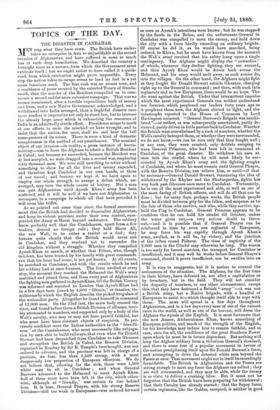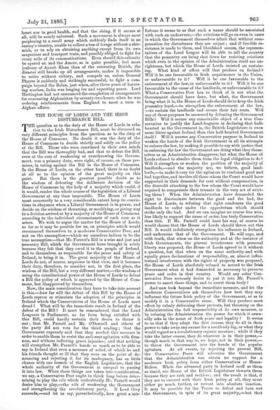TOPICS OF THE DAY
THE DISASTER IN CANDAHAR.
MEN reap what they have sown. The British have under- taken no enterprise in Asia so unjustifiable as the second invasion of Afghanistan, and have suffered in none so much lose or such deep humiliation. We described the country a fortnight since as a morass, from which the Government must extricate itself ; but we ought rather to have called it a quick- sand, from which extrication might prove impossible. Every step the nation takes to escape seems to land its feet in a yet more tenacious sand. The first rush was no sooner over, and a semblance of peace secured by the extorted Treaty of Ganda- muck, than the murder of the Resident compelled us to com- mence a second and far more extensive campaign. That was no sooner terminated, after a terrible expenditure both of money and lives, and a new Native Government acknowledged, and a withdrawal into India arranged, than a frightful disaster once more renders it imperative not only to stand fast, but to increase the already large army which is exhausting the resources of India in an admittedly sterile effort. Providence seems to mock at our efforts to undo the mischief we have wrought, and to insist that the nation, for once, shall see and hear the full consequences of its crime. There is even a kind of dramatic completeness in the method of our punishment. The nominal object of our invasion—in reality, a gross instance of bucca- neering—was to force the Afghans to admit a British Resident in Cabul ; and because we succeeded, because the Resident was at last accepted, we were dragged into a second war, employing sixty thousand men. We were still unwilling to retire without something to show for all the lives and money expended, and therefore kept Candahar in our own bands, or those of our vassal ; and because we kept it, we have again to employ our whole strength to avenge a defeat which, un- avenged, may turn the whole course of history. Not a man can quit Afghanistan until Ayoub Khan's army has been scattered, and it will be well if we have not Afghanistan to reconquer, in a campaign to which all that have preceded it will seem like trifles.
As we pointed out some time since, the formal announce- ment that the British had decided to dismember Afghanistan, and keep its richest province under their own control, exas- perated the Army at Herat beyond endurance. The soldiery knew perfectly well that the Candaharees, apart from a few traders, desired no foreign rule ; they held Shere Ali, the new Wall, to be either a traitor or a fool ; they foresaw quite clearly that the British would never rest in Candahar, and they resolved not to surrender the old kingdom without a struggle. Whether they compelled Ayoub Khan to march, or whether that Prince, who, though indolent, has been trusted by his family with great commands, saw that his hour had come, is not yet known. At all events, he marched on Candahar, and with the results which he and his soldiery had at once foreseen. The force swelled at every step, the moment they reached the Helmund the Wall's army mutinied and joined them, and from every part of Afghanistan the fighting men gathered to Ayoub Khan, till the British Viceroy was informed and reported to London that Ayoub Khan had in a few days been joined by 4,000 " Ghazis," or fanatics, the nickname by which the English describe the picked irregulars of the nationalist party. Altogether he found himself in command of 12,000 men. On the 23rd inst. the main body crossed the river, and found before them a British Division of all arms, terri- bly attenuated in numbers', and supported only by a body of the Wali's cavalry, who may or may not have proved faithful, but who must have been constant objects of suspicion. So per- versely confident were the Indian authorities in the " friendli- ness " of the Candaharees, who must necessarily like subjuga- tion by men able to build railways, that even when Sir Donald Stewart had been despatched from Candahar to take Ghuznee and strengthen the British in Cabul, the Reserve Division, organised in Bombay by Sir R. Temple's forethought, was not ordered to advance, and the province was left in charge of a garrison, we fear, less than 3,500 strong, with a most dangerously low proportion of European effectives. We do not believe that, allowing for the sick, there were 1,500 white men in all in Candahar ; and when General Burrows advanced to the Helmund to meet Ayoub Khan, half of these must have been left in the city, which other- wise, although so " friendly," was certain to rise behind him. It is true, General Phayre, with his strong Reserve Division—still too weak in Europeans—was ordered forward as soon as Ayoub's intentions were known ; but he was stopped' by the floods in the Bolan, and the unfortunate General in Candahar was compelled to meet the enemy, and hold down- the city with a force hardly exceeding an ordinary brigade. Of course he did it, as he would have marched, being ordered, to Khiva, but he must have known from the moment the Wali's army revolted that his safety hung upon a single contingency. The Afghans might display the "cowardice " of which, whenever they decline fighting, they are accused, and then Ayoub Khan would be driven back across the Helmund, and his army would melt away, as such armies do, into the villages. On the other hand, the Afghans might fight as they fought Sir Donald Stewart outside Ghuznee, charging
right up to the General in command ; and then, with such thin regiments and so few Europeans, there would be no hope. The die went against the British. Under that intermittent impulse. which the most experienced Generals can neither understan& nor forecast, which perplexed our leaders forty years ago as it perplexes them now, the Afghans elected to fight, and the catastrophe reported to the House of Commons by Lords Hartington occurred. "General Burrows's Brigade was annihi- lated,"—or rather, as was subsequently ascertained, partly de- stroyed, partly driven in little parties back to Candahar. Whether the British were overwhelmed by a rush of numbers, whether the Wali's cavalry betrayed them, or whether they were surrrounded, we do not know,—we can be sure only that they fought well ; in any case, they were crushed, only driblets escaping te warn General Primrose, who had been left in command at. Candahar, of the great disaster. He withdrew his men at once into the citadel, where he will most likely be sur- rounded by Ayoub Khan's army and the fighting roughs. of Candahar, and where he must remain until General Phayre,. with the Reserve Division, can relieve him, or until—if that be necessary—General Donald Stewart, renouncing the idea or withdrawal by the Khyber and the Shuturgardan, fights his way back past Ghuznee once more to Candahar. Fortunately, he is one of the most experienced and able, as well as one of the most daring of British officers, and will do all that can be done ; but for many days, perhaps weeks, the British peopret must be divided between pity for the fallen, and suspense as to' the fate of those who survive, and who, while they survive, up- hold the Flag in Candahar. General Primrose appears to be- confident that he can hold his citadel till October, unless- the water gives out,—a very serious doubt to throw out,—and it is possible that if General Phayre can be reinforced in time by even one regiment of Europeans,. he may force his way rapidly through Ayoub Khan's army, swelled, as it will be, by victory, and the junction of the tribes round Pisheen. The time of captivity of the- 2,000 men in the Citadel may otherwise be long. The season is too early for forced marches, the transport for Candahar is insufficient, and it may well be weeks before General Phayre's command, should it prove insufficient, can be swollen into an army.
It is easy to exaggerate, but it is useless to conceal the seriousness of the situation. The Afghans, for the first time in their history, have defeated us, not after a capitulation or by treachery, but in the field. They will not consider the disparity of numbers, or any other circumstance, except. this, that they have destroyed a British "army "—it was not a British army, but a Native brigade, with a handful of Europeans to assist it—which thought itself able to cope with them. The news will spread in a few days throughout Afghanistan, and in a few days every man of one of the vainest races in the world, as well as one of the bravest, will deem the Afghans the equals of the English. It is most fortunate that the new Ameer, Abdurrahman Khan, knows something of European polities, and much of the strength of the English,. for his knowledge may induce him to remain faithful, and so earn, once for all, the confidence of the great Southern Power upon which he must be in future dependent. But nothing wilt keep the Afghan soldiery from a victorious General's standard, and there is some fear of a popular movement in favour of the nation precipitating itself upon Sir Donald Stewart's force, and attempting to drive the detested white men beyond the Passes at once. That movement might not in itself be exceedingly formidable. The British in Afghanistan and the Passes are strong enough to meet any force the Afghans can collect ; they are well commanded, and they may be able, while the enemy is so elate, to deliver a crushing blow. Bat it must not be forgotten that the British have been preparing for withdrawal ; that their Cavalry has already started ; that the Sepoy force,. certain regiments, like the Guides, excepted, is neither in good. heart nor in good health, and that the rising, if it occurs at all, will be nearly universal. Such a movement is always most perplexing to a small army which suddenly finds itself in an enemy's country, unable to collect a ton of forage without a skir- mish, or to rely on obtaining anything except from its own magazines and transport train, and possibly obliged to fight for every mile of its communications. Even should this calamity be spared us, and the Ameer, as is quite possible, feel more jealousy of Ayoub Khan than of the retreating British, the disaster still breaks up all arrangements, makes it impossible to retire without victory, and compels us, unless General Phayre is suddenly and strikingly successful, to fight a cam- paign beyond the Bolan, just when, after three years of harass- ing warfare, India was longing for and expecting peace. Lord Hartington had not announced the completion of arrangements for evacuating Afghanistan by seventy-two hours, when he was ordering reinforcements from England to meet a turn in Afghan affairs.



































 Previous page
Previous page